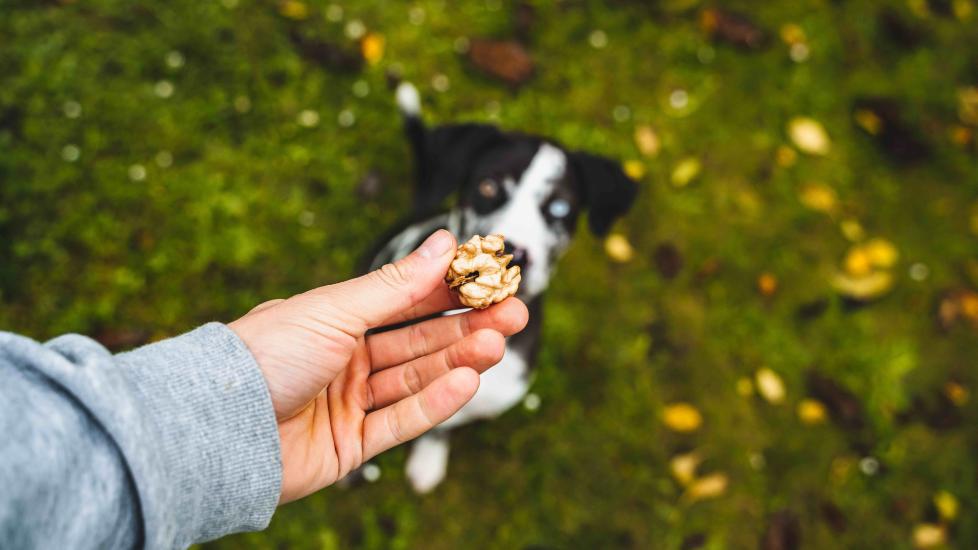Can Dogs Eat Walnuts?
NOTE: Always check with your veterinarian first before giving your dog any new foods, especially “people foods.” What might be OK for one dog might not be good for your dog, depending on multiple factors, such as their age, health history, health conditions, and diet. Dogs on prescription diets should not be fed any food or treats outside the diet.
Dogs tend to stick their noses into all kinds of things in the kitchen and out in the yard. And if your pooch is a chow hound who’s interested in eating everything, they may opt to sneak a bite of something out of the ordinary … even walnuts. But is it safe for dogs to eat walnuts? The answer depends on the type of walnut in question.
Generally speaking, it’s OK for dogs to eat one or two pieces of an English walnut, which is the kind you’re more likely to have on hand for snacks or baking. These walnuts won’t harm your dog when eaten in very small quantities. But black walnuts (the kind that fall off trees and squirrels bury in your yard) are toxic to dogs and should be avoided.
Keep reading to learn more about feeding walnuts to your dog, when to avoid them, and when you may need to call the vet.
Are Walnuts Bad for Dogs?
Unlike other nuts that are OK for dogs to eat, like peanuts or pistachios, walnuts are a little trickier. English walnuts are generally safe for dogs to eat in very small portions, but black walnuts are toxic for dogs.
Black Walnuts
Black walnuts contain a toxin called juglone, which can cause upset stomach, vomiting, and diarrhea. If your dog happens to eat one he found outside, call your vet.
In addition to the toxicity of black walnuts, there is also the risk of choking or intestinal blockage.
English walnuts are generally safe for dogs to eat in very small portions, but black walnuts are toxic for dogs.
English Walnuts
While English walnuts are fine to offer in very small amounts as an occasional treat, they’re not a great option for your dog. Walnuts are high in fat and often are prepared with salt or other seasonings. Because of this, ingesting more than a few English walnuts may cause an upset stomach, diarrhea, vomiting, or even pancreatitis.
Like with black walnuts, English walnuts can make your dog choke or cause an intestinal blockage. So while a tiny nibble of a small piece of English walnut probably won’t make your pet sick, there are other treat options that are safer for them to enjoy.
My Dog Ate a Walnut. Now What?
If you think your pup ate a walnut and he shows symptoms of illness, contact your vet ASAP. In some cases, prompt treatment may be necessary to prevent serious complications. If you suspect your dog ate a black walnut, monitor them closely for the following symptoms of walnut poisoning:
-
Loss of appetite
Alternatively, if your dog has swallowed a whole walnut of any variety, watch for the following signs of intestinal blockage:
-
Vomiting
-
Diarrhea or difficulty pooping
-
Loss of appetite
-
Lethargy or weakness
-
Abdominal pain
Contact your vet if your dog shows any of these symptoms. They’ll help you determine next steps, including whether a visit to the clinic is necessary.
Any time you’re concerned about something your dog has eaten, call your vet or the Pet Poison Helpline at (855) 764-7661. They’ll help you determine next steps based on your pet’s health and the amount eaten in relation to their size.
Can Dogs Die From Eating Walnuts?
While it's rare for dogs to die from eating walnuts, there is a risk of serious health problems from feeding them to your furry friend. The toxicity of black walnuts and the risk of choking or intestinal blockage from feeding whole walnuts can be dangerous for dogs. It's best to avoid feeding your dog walnuts altogether to prevent any potential health problems.
Can Dogs Eat Other Nuts?
While walnuts may not be the best choice for dogs, there are other nuts that are safe for them to eat on occasion, including:
All of these are not toxic for dogs, but you’ll still want to ensure they’re not a choking hazard. Any nuts given to your dog should be unsalted and unseasoned, and given in moderation.
It's best to avoid feeding your dog walnuts altogether and to opt for safer snacks that won’t make your dog sick. As always, consult with your vet before introducing any new foods to your dog's diet. You can also ask them for recommendations for “people foods” that are safe to share with your pet.
Featured Image: Adobe/vojta
